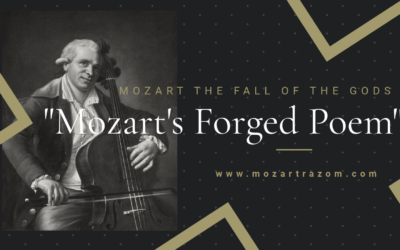Wolfgang Amadé Mozart
A Legacy Rewritten by the Shadows of History
Mozart’s image, often regarded as a universal symbol of musical genius, was heavily manipulated by the Nazi regime, a fact largely ignored in post-war efforts to “denazify” German culture. From propaganda-driven films to anti-Semitic narratives, Mozart’s legacy is far more complex and troubling than we are often led to believe.
Mozart: The Fall of the Gods
This book offers a fresh and critical look at the life of Wolfgang Amadeus Mozart, challenging the myths that have surrounded him for centuries. We strip away the romanticised image of the “natural genius” and delve into the contradictions within Mozart’s extensive biographies. Backed by nearly 2,000 meticulously sourced citations, this work invites readers to explore a deeper, more complex understanding of Mozart. Perfect for those who wish to question the traditional narrative, this biography is a must-read for serious music lovers and historians.
“Mozart, as well as Wagner, was awarded the title of honorary Nazi during the Third Reich.”
Mozart: The Fall of the Gods
In popular culture, Wolfgang Amadeus Mozart is often celebrated as a near-mythical figure, a genius whose music transcends time and borders. Yet, if we turn our gaze towards a different side of history, we find a more complex and less flattering legacy entwined with political manipulation and propaganda. Rather than the eternal “beloved of the gods,” Mozart’s image was exploited by regimes with questionable motives, most notably during the Nazi era.
After World War II, attempts were made by the Allied forces to cleanse German culture of its Nazi influences, a process known as “denazification.” Yet, despite the focus on prominent figures like Richard Wagner, Mozart’s association with the Nazi regime was largely overlooked. Throughout the Third Reich, Mozart’s music was manipulated to fit Nazi ideology, portraying him as a symbol of Aryan cultural superiority. Publications from the period were reissued, propaganda-ridden prefaces were left largely untouched, and revisions were minimal.
Heinrich Damisch, a fervent Nazi supporter and former director of the Wiener Mozart-Gemeinde, was central to this manipulation. Damisch not only contributed to anti-Semitic rhetoric but also continued to be celebrated in post-war Austria with high honours, despite his troubling legacy. His vile anti-Semitic views were ignored, and he was even honoured with the prestigious Gold Medal for services to the Austrian Republic in the late 1950s. This troubling complicity cast a long shadow on the legacy of Mozart and his association with the Salzburg Festival, a cultural institution deeply intertwined with Nazism.
Perhaps one of the most egregious examples of this tainted legacy is the film Wen die Götter lieben (Whom the Gods Love), commissioned by Joseph Goebbels in 1942. The film presented a heavily sanitised and distorted version of Mozart’s life, where figures such as Lorenzo Da Ponte, the Jewish librettist of The Marriage of Figaro, were erased, replaced by the Aryan Franz Süssmayr. This rewriting of history to fit Nazi ideology illustrates the extent to which Mozart’s image was co-opted to serve the regime’s goals.
Yet, after the war, this darker chapter of Mozart’s legacy was largely forgotten, overshadowed by the romanticised narrative of his “universal genius.” The uncomfortable truth about how his music and image were exploited was swept under the rug. Mozart remains, for many, a beacon of musical purity, while the shadows of history tell a far more disturbing tale.
In popular culture, Wolfgang Amadeus Mozart is often celebrated as a near-mythical figure, a genius whose music transcends time and borders. Yet, if we turn our gaze towards a different side of history, we find a more complex and less flattering legacy entwined with political manipulation and propaganda. Rather than the eternal “beloved of the gods,” Mozart’s image was exploited by regimes with questionable motives, most notably during the Nazi era.
After World War II, attempts were made by the Allied forces to cleanse German culture of its Nazi influences, a process known as “denazification.” Yet, despite the focus on prominent figures like Richard Wagner, Mozart’s association with the Nazi regime was largely overlooked. Throughout the Third Reich, Mozart’s music was manipulated to fit Nazi ideology, portraying him as a symbol of Aryan cultural superiority. Publications from the period were reissued, propaganda-ridden prefaces were left largely untouched, and revisions were minimal.
Heinrich Damisch, a fervent Nazi supporter and former director of the Wiener Mozart-Gemeinde, was central to this manipulation. Damisch not only contributed to anti-Semitic rhetoric but also continued to be celebrated in post-war Austria with high honours, despite his troubling legacy. His vile anti-Semitic views were ignored, and he was even honoured with the prestigious Gold Medal for services to the Austrian Republic in the late 1950s. This troubling complicity cast a long shadow on the legacy of Mozart and his association with the Salzburg Festival, a cultural institution deeply intertwined with Nazism.
Perhaps one of the most egregious examples of this tainted legacy is the film Wen die Götter lieben (Whom the Gods Love), commissioned by Joseph Goebbels in 1942. The film presented a heavily sanitised and distorted version of Mozart’s life, where figures such as Lorenzo Da Ponte, the Jewish librettist of The Marriage of Figaro, were erased, replaced by the Aryan Franz Süssmayr. This rewriting of history to fit Nazi ideology illustrates the extent to which Mozart’s image was co-opted to serve the regime’s goals.
Yet, after the war, this darker chapter of Mozart’s legacy was largely forgotten, overshadowed by the romanticised narrative of his “universal genius.” The uncomfortable truth about how his music and image were exploited was swept under the rug. Mozart remains, for many, a beacon of musical purity, while the shadows of history tell a far more disturbing tale.
You May Also Like
#3 Leopold Mozart’s Literary Theft
Hidden within the Mozarteum’s archives lies a poem that has long been hailed as a tribute to the young Mozart children. But behind this innocent façade is a story of deception, literary theft, and one father’s ambition to rewrite history.
#4 The Golden Spur
While often portrayed as a prestigious award, the Golden Spur (Speron d’Oro) granted to Mozart in 1770 was far from a reflection of his musical genius. In this article, we delve into the true story behind this now-forgotten honour, its loss of value, and the role of Leopold Mozart’s ambitions in securing it.
Mozart Unmasked: The Untold Story of His Italian Years
Explore the lesser-known side of Wolfgang Amadé Mozart’s early years in Italy. ‘Mozart in Italy’ unveils the complexities, controversies, and hidden truths behind his formative experiences, guided by meticulous research and rare historical documents. Delve into a story that challenges the traditional narrative and offers a fresh perspective on one of history’s most enigmatic composers.
Another Example of Borrowed Genius
The myth of Mozart’s genius continues to collapse under the weight of his reliance on others’ ideas, with Leopold orchestrating his son’s supposed early brilliance.
A Genius or a Patchwork?
The genius of Mozart had yet to bloom, despite the anecdotes passed down to us. These concertos were not the work of a prodigy, but a collaborative effort between father and son, built on the music of others.
Myth, Reality, and the Hand of Martini
Mozart handed over Martini’s Antiphon, not his own, avoiding what could have been an embarrassing failure. The young prodigy had a lot to learn, and much of what followed was myth-making at its finest.







